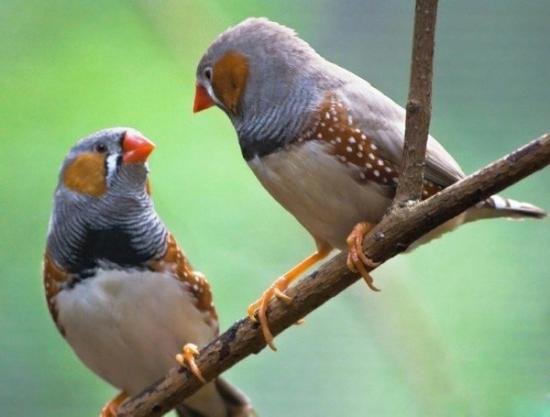科研人员提出,由于从斑胸草雀的雄性祖先那里流传下来的遗传突变,雌性斑胸草雀可能对它们的伴侣不忠。Wolfgang Forstmeier及其同事观察到了来自连续5代的1500多只捕获的斑胸草雀的交配以及展示行为。在许多一夫一妻制的物种中,很大一部分后代的父亲是另外的雄性。科研人员一直在争论为什么有伴侣的雌性与其他雄性交配,而这种乱交没有提供明显的收益,而且还有失去父方的照顾以及性传播疾病等代价。这组作者对彩色色带标记的鸟进行了视频监控,他们首先观测了独身雄性和独身雌性之间的安排好的相遇,然后研究了已配对的鸟在公共繁殖鸟舍中的行为。遗传分析显示,乱交的雄性倾向于得到乱交的女儿。这些结果提示,加强了雄性乱交行为的遗传突变——这导致了数量更多、更多样的后代——可能类似地促进了雌性的乱交。这组作者指出,这种对一夫一妻制体系中不忠的解释也可能适用于人类。

斑胸草雀
生物探索推荐英文原文:
Why females cheat
Female zebra finches may cheat on their mates due to genetic variants handed down from their male ancestors, research suggests. Wolfgang Forstmeier and colleagues observed mating and display behavior in more than 1500 captive zebra finches from five consecutive generations. In many species that form monogamous pairs, a large portion of offspring are sired by extra-pair males. Researchers continue to debate why bonded females engage in copulation with other males when promiscuity offers no clear benefits and is associated with costs such as withdrawal of paternal care and sexually transmitted disease. Using video monitoring of color-banded birds, the authors first observed staged encounters between bachelor males and bachelor females, and then examined the behavior of pair-bonded birds in communal breeding aviaries.. Genetic analyses revealed that promiscuous males tend to sire promiscuous daughters. The results suggest that genetic variants that enhance promiscuous behavior in males, which results in more and varied offspring, may similarly promote promiscuity in females. The authors note that this explanation for infidelity in monogamous systems may also apply to humans.
生物探索推荐英文论文摘要:
Female extrapair mating behavior can evolve via indirect selection on males
Abstract
In many species that form socially monogamous pair bonds, a considerable proportion of the offspring is sired by extrapair males. This observation has remained a puzzle for evolutionary biologists: although mating outside the pair bond can obviously increase the offspring production of males, the benefits of such behavior to females are less clear, yet females are known to actively solicit extrapair copulations. For more than two decades adaptionist explanations have dominated the discussions, yet remain controversial, and genetic constraint arguments have been dismissed without much consideration. An intriguing but still untested hypothesis states that extrapair mating behavior by females may be affected by the same genetic variants (alleles) as extrapair mating behavior by males, such that the female behavior could evolve through indirect selection on the male behavior. Here we show that in the socially monogamous zebra finch, individual differences in extrapair mating behavior have a hereditary component. Intriguingly, this genetic basis is shared between the sexes, as shown by a strong genetic correlation between male and female measurements of extrapair mating behavior. Hence, positive selection on males to sire extrapair young will lead to increased extrapair mating by females as a correlated evolutionary response. This behavior leads to a fundamentally different view of female extrapair mating: it may exist even if females obtain no net benefit from it, simply because the corresponding alleles were positively selected in the male ancestors.







